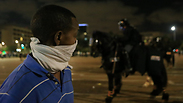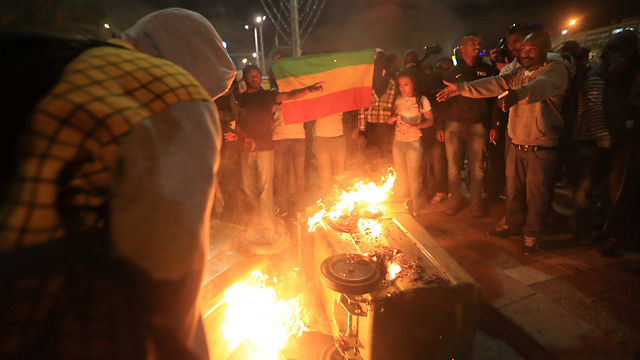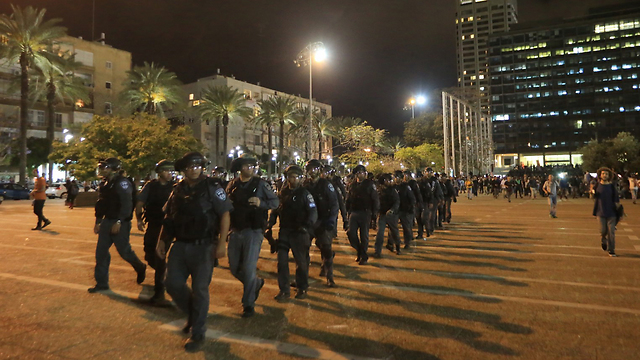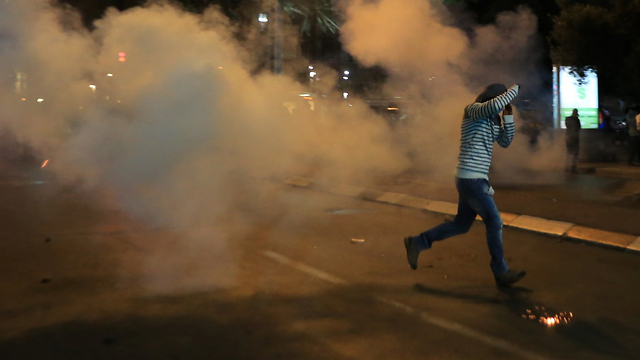
Fear and desperation in Rabin Square
Op-ed: The demonstrations in Tel Aviv caused traffic jams and inconvenience, but there was little sign of the violence to come.
More than anything else, I was afraid. I stood there, surrounded by members of my community crying out against years of oppression, with the horses' hooves causing the ground beneath our feet to shake and the tear gas burning our eyes, after long hours and days of protest – and we were afraid.
We were afraid of the police officers; we were afraid of the violence that was spreading like wildfire - and we were afraid, no less so, for the future of the country if we don't make our voices heard.
The demonstrations staged in Tel Aviv by the members of the Ethiopian community throughout Sunday afternoon and evening did indeed cause traffic jams in the city and surrounding areas; but even at their peak, the protests didn't appear to be turning into violent unrest and a bloody battle between demonstrators and the police.
But then, shortly before eight in the evening, thousands of demonstrators gathered in Tel Aviv's Rabin Square. And a short while after the Ayalon Highway was reopened to traffic, portions of Ibn Gvirol Street and other roads around the square were blocked off – and from there, things soon took a turn for the worse.
According to police assessments, the demonstration in the square was a spontaneous one, unplanned. There had been no request for a permit to protest in the square, and no permit had been granted; but this in itself should not have made the unrest inevitable.
And thus they found themselves on either end of the square – on the one side, a large group of angry demonstrators, fired up with rage from the protests of the past few days and long years of discrimination; and on the other side, a long line of police officers, more than a thousand, wearing helmets and armed with brutal riot-dispersal equipment. By that time, a violent flare-up appeared unavoidable – and it wasn't long before the flames took hold.
"We aren't violent people," the demonstrators shouted, raising their arms in the air. "We don't want violence; we are voicing our pain."
But at that stage, things got out of control: Stones started flying in all directions, and bottles and trash bins and even scooters that were parked on the side of the road soon followed; the windshields and windows of parked cars were smashed too.
And the police response was no less violent: Mounted officers charged the crowd, without warning, in an effort to disperse the demonstration; stun grenades and tear-gas canisters were fired at the rioters; and trucks armed with water cannons were deployed center stage. The demonstrators, for their part, didn't relent, and tried to force their way into the Tel Aviv City Hall building overlooking the square.
At some point, the protesters overturned a police patrol car parked on the corner of Ibn Gvirol and Frishman. It wasn't the most violent incident in Rabin Square on Sunday night; but it, better than anything else, symbolized the demonstration's turn of events – and the patrol car remained there like that for quite some time, on its roof, silent testimony to the utter chaos all around.
Later into the night, with the ambulance sirens filling the air, the unrest began to subside. A total of 41 people – police officers and demonstrators – sustained injuries; and 26 demonstrators were arrested. But even after things calmed down a little, many of the demonstrators remained in the area.
Hundreds hung around to decry the ongoing discrimination, as well as the heavy handed manner in which the police chose to quell their protest. The violence by then, around midnight, had indeed subsided, and the large police presence had prevented the unrest from spilling over into other surrounding streets – but the protest appeared far from over.













